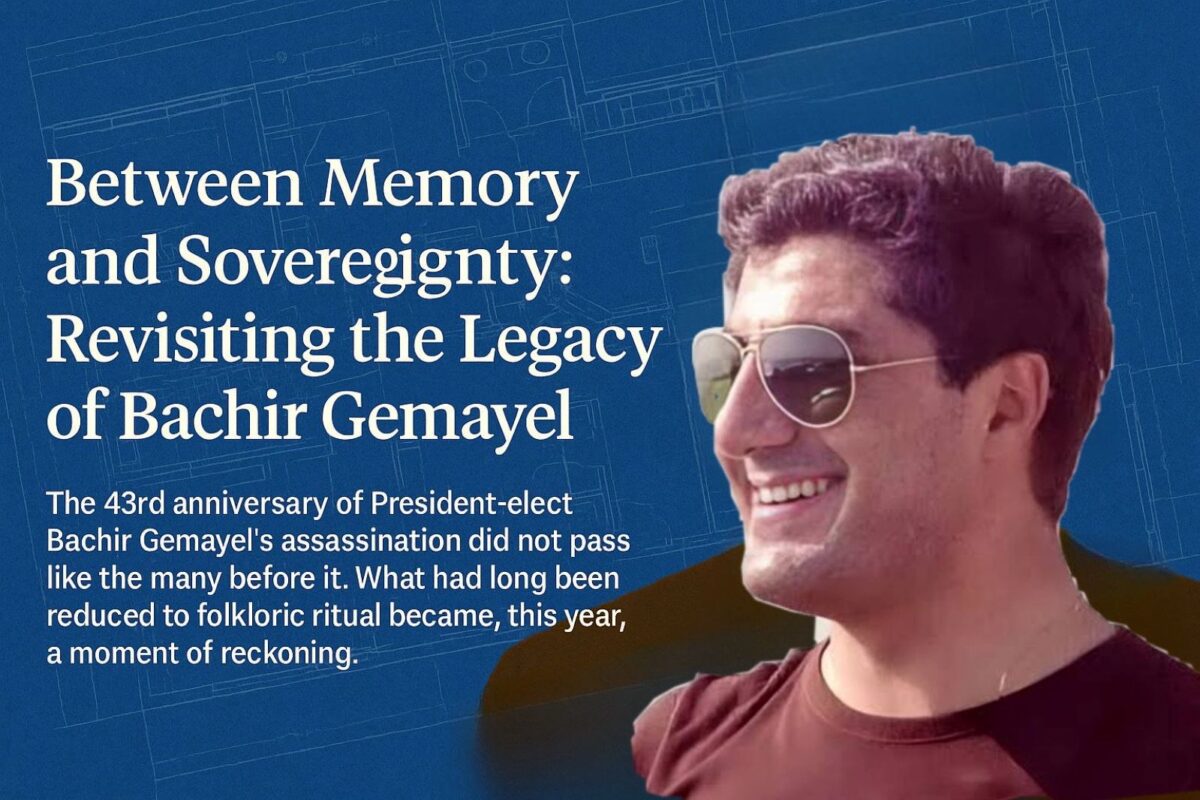
The 43rd anniversary of President-elect Bachir Gemayel’s assassination did not pass like the many before it. What had long been reduced to folkloric ritual became, this year, a moment of reckoning. Bachir was never just a passing Maronite figure; he symbolized an unfinished republican project—an attempt to remake Lebanon amid the ruins of sectarian fragmentation, foreign domination, and chronic betrayal.
What distinguished this commemoration was the voice of the Lebanese state itself. For the first time in over four decades, officialdom broke its silence. President Joseph Aoun and Prime Minister Nawaf Salam spoke in unambiguous sovereign terms, reminding citizens that Bachir—elected legitimately by parliament—was murdered by Hafez al-Assad’s regime. His killing was not an isolated tragedy but part of a calculated campaign of assassinations that continues to haunt Lebanon: Kamal Jumblatt, René Moawad, Grand Mufti Hassan Khaled, Gebran Tueni, Rafik Hariri, Lokman Slim. The message was clear: the destruction of leaders was inseparable from the dismantling of the Lebanese state.
This acknowledgment signals a subtle but profound shift. Lebanon is beginning to confront its own political memory. The old binaries—“pro-Syria” versus “pro-Israel”—no longer suffice. The sharper question now is: who assassinated the project of statehood, and who profited from its absence? Over time, Lebanese society has acquired an immunity to the moral blackmail that long stigmatized those who challenged the region’s ideological orthodoxies.
The irony is striking. Those who once branded Bachir a traitor for his wartime dealings with Israel later bound themselves, willingly or not, to the designs of Syria and Iran. Both projects yielded displacement, impoverishment, and the collapse of institutions. The self-proclaimed custodians of patriotism ended up disarmed, dispossessed, and dependent on foreign patrons indifferent to Lebanon’s survival.
At Sassine Square where thousands gathered this year, MP Nadim Gemayel reframed the legacy with precision: Bachir was not a sectarian saint but a man with a project. He envisioned a strong, just, and sovereign state, willing to confront both warlords and regional overlords. A musical performance weaving Bachir’s archival speeches into its score reminded the audience of a political language that was once bold, disruptive, and transformative—not nostalgia, but possibility.
Bachir was among the first to reject the 1943 National Pact in its ossified form. He understood that what was once a pragmatic compromise had become a fragile sectarian bargain, incapable of adapting to demographic realities and regional upheavals. Thrust into the Arab-Israeli conflict, Lebanon bore disproportionate costs. For him, a new compact was overdue—sturdier, more realistic, more sovereign.
At the heart of his project was the state as an institution. He imagined a republic with independent decision-making, a unified army, and a strong judiciary. Unlike many who came after him, Bachir was not accused of personal enrichment. His choices were divisive, but they were not corrupt. In Lebanon’s long parade of rulers, that distinction matters.
Lebanon today cannot recover without confronting the root of its collapse: the absence of sovereign decision-making under the shadow of illegitimate arms. Any credible national project must begin with disarmament. Only then can dialogue chart a vision beyond the Taif Accord—one that responds to the seismic shifts reshaping the Middle East.
The current republic is out of time and out of place. Shackled by sectarian paralysis, a hollowed-out constitution, and externally imposed balances of power, it cannot meet the demands of the present. Lebanon needs not another symbolic gathering of elites, but a foundational process: to redefine the national compact around citizenship, productivity, and full sovereignty. The baseline must be uncompromising—no weapons outside the state, no conditional sovereignty, no armed veto over politics.
To honor Bachir Gemayel is not to sanctify him, nor to confine his memory to one sect or one neighborhood. It is to revisit his project rationally and adapt it to the present. Lebanon needs a new national awakening—one that reclaims sovereignty, restores institutions, and shields the constitution from distortion.
Bachir’s message was deceptively simple: one state, one army, one judiciary, one nation that bows to no outside power. He knew such a project would not please all, and he paid for it with his life. Forty-three years later, his vision remains unfinished.
The responsibility now lies with those who invoke his name: will remembrance become action? Will Lebanon continue to canonize its martyrs—or will it finally achieve what they died for?
This article originally appeared in Nidaa al-Watan
Makram Rabah is the managing editor at Now Lebanon and an Assistant Professor at the American University of Beirut, Department of History. His book Conflict on Mount Lebanon: The Druze, the Maronites and Collective Memory (Edinburgh University Press) covers collective identities and the Lebanese Civil War. He tweets at @makramrabah







